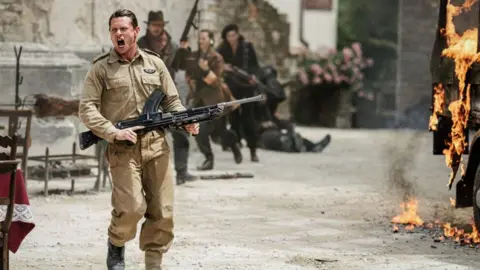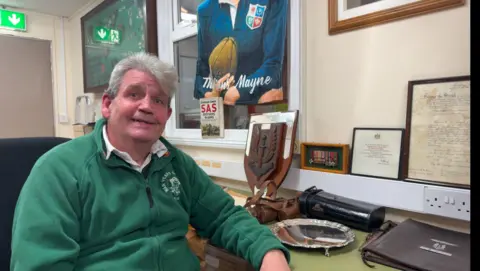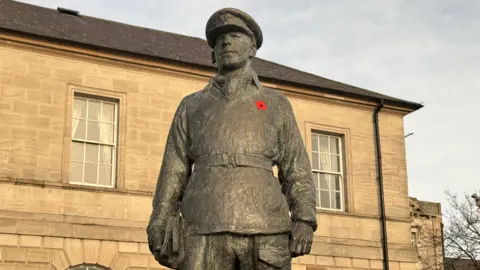Calls to honour 'bravest man not to win a Victoria Cross'
 Banijay Rights
Banijay RightsMore than eight decades have passed since a small group of commandos wreaked havoc on the Nazis and their Italian allies in North Africa, marking the birth of one of the British Army's most well known, and sometimes controversial regiments - the Special Air Service (SAS).
Now, there are fresh calls for one of the leaders of those commandos - Blair 'Paddy' Mayne - to be awarded the Victoria Cross (VC), the highest British award for gallantry in the face of the enemy.
There is fresh interest in the Newtownards soldier and rugby international, who became famous for his daring deeds behind enemy lines, due to the second series of BBC drama SAS Rogue Heroes - although his portrayal has been controversial.
Despite being highly decorated, Mayne was never given the highest award of all.
Who was Blair Mayne?
David McCallion, a local historian and founder of the War Years Remembered project in Newtownards, County Down, said Mayne should have been awarded the VC during World War Two.
"He is the bravest man not to be awarded the VC, that's his legacy," Mr McCallion said.
"There's no doubt about it, he was a born, natural leader, his men would follow him to hell and back."
Mayne, who went to Regent House School in Newtownards before studying law at Queen's University Belfast, volunteered for service at the start of the war.
Soon after he put his name forward to join the Commandos, a new group of amphibious assault troops drawn from across the British armed forces.
He was subsequently recruited into the SAS and led a mission in November 1941 that was to be its first major success - an attack on a Libyan airfield, which saw dozens of enemy aircraft destroyed.
In January 1943, he took command of the SAS and went on to lead his men in Sicily before the SAS took part in the Allied invasion of Normandy and onwards to Germany.
Blair Mayne: Fact vs fiction?
Blair Mayne's depiction in Rogue Heroes has been controversial.
In the series, he is portrayed as foul-mouthed, reckless and, at times, ill-disciplined.
In contrast, the real Mayne was described as soft-spoken, empathetic and someone who rarely, if ever, used foul language.
Mr McCallion said Mayne was a much more thoughtful character than the one portrayed in Rogue Heroes.
"He methodically thought about his actions and the risks that he was taking, and they were calculated risks," he said.
"The men who served under Blair knew that.
"It seemed to be everything he put his hand to came naturally to him."
Mr McCallion said SAS members were under "extreme pressure" and knew that if they were captured they were certain to be executed.

As such, he added, Mayne's role as the SAS' discipline officer in its earliest days indicated that his temperament was a far cry from that portrayed in the TV show.
Ulster Unionist Party assembly member Doug Beattie, a former soldier and veteran of the wars in Iraq and Afghanistan, called Mayne's depiction "disgraceful" and the series "appalling".
Rogue Heroes has, however, been positively received by TV critics - a five-star review in the Guardian called it a "a thrill to watch".
Jack O'Connell, who plays Mayne in Rogue Heroes, said he loved portraying him on-screen.
"We can do all the research in the world but at the end of the day it's what [writer] Steven Knight has offered on page that has to be the main guidance," he said
"We do obviously tell a historical tale but it's quite reimagined, there's a lot of room to play with within that."
He added that he felt his portrayal of Mayne was ultimately a "heroic story".
Meanwhile, the SAS has gone on to become both famous and at times controversial for its secretive missions.
Why did Blair Mayne not get a VC?
Mayne was one of only eight people during World War Two to be awarded the Distinguished Service Order (DSO) four times - at the time, it was the second-highest gallantry award behind the VC.
Author Damien Lewis, who has written several books on the SAS, said it remained a mystery why Mayne was not given the VC, despite being recommended for it near the end of the war.
"When Paddy Mayne eventually went to get the third bar to his DSO - to meet the King at Buckingham Palace - the King actually said to him words to the effect of: 'I cannot understand why the Victoria Cross has so strangely eluded you.'
Mr Lewis said Mayne's predecessor as commander of the SAS, David Sterling, called the failure to award the VC an "outrage" and suggested it had been blocked because "the powers that be" did not want to give the medal to anyone in the SAS.
"The unit was not popular, there are many reports I have read in which they are referred to by senior commanders as 'raiders of the thug variety'," Mr Lewis said.
No UK member of the SAS has ever been awarded a VC.
But, not for the first time, there are calls for Mayne to be awarded the VC posthumously.
This would be an unprecedented move in the UK - while many people have been awarded the medal after death, nobody has been honoured so many years after their acts of gallantry.
Democratic Unionist Party (DUP) MP for Strangford, Jim Shannon, has put forward a motion in the House of Commons calling for it to happen, while three former defence secretaries have also spoken in favour.
It is far from straightforward, but Mr Lewis said he felt there was momentum building and this time around it might happen.

A 'troubled life' post-war
After the war, Mayne returned to Newtownards.
In December 1955, he attended a Masonic function and then had drinks in Bangor. In the early hours of the morning, he was involved in a car crash and died. He was 40 years old.
Mayne subsequently gained a reputation as a hellraiser - both for some of his alleged conduct away from the battlefield and his lifestyle in post-war Northern Ireland.
"Every time Paddy Mayne lost one of his men it hurt him, it affected him deeply, he endeavoured to bring every man out alive and, of course, sometimes he failed and he found it very difficult," Mr Lewis said.
"I believe that's part of the reason he had a troubled life after the war."
Mr Lewis said an expert on PTSD who had read his books told him that "one of those missions is enough to give you terrible trauma - five years of missions behind enemy lines it's impossible you would not come back plagued by PTSD".
Almost 70 years after his death, Mayne remains, for many, a fascinating and complex figure.
"If you tried to write a fictional figure for Hollywood you could not make Paddy Mayne up," Mr Lewis said.
SAS Rogue Heroes is available on BBC iPlayer.
13 January 2025 - this article was updated for accuracy.
